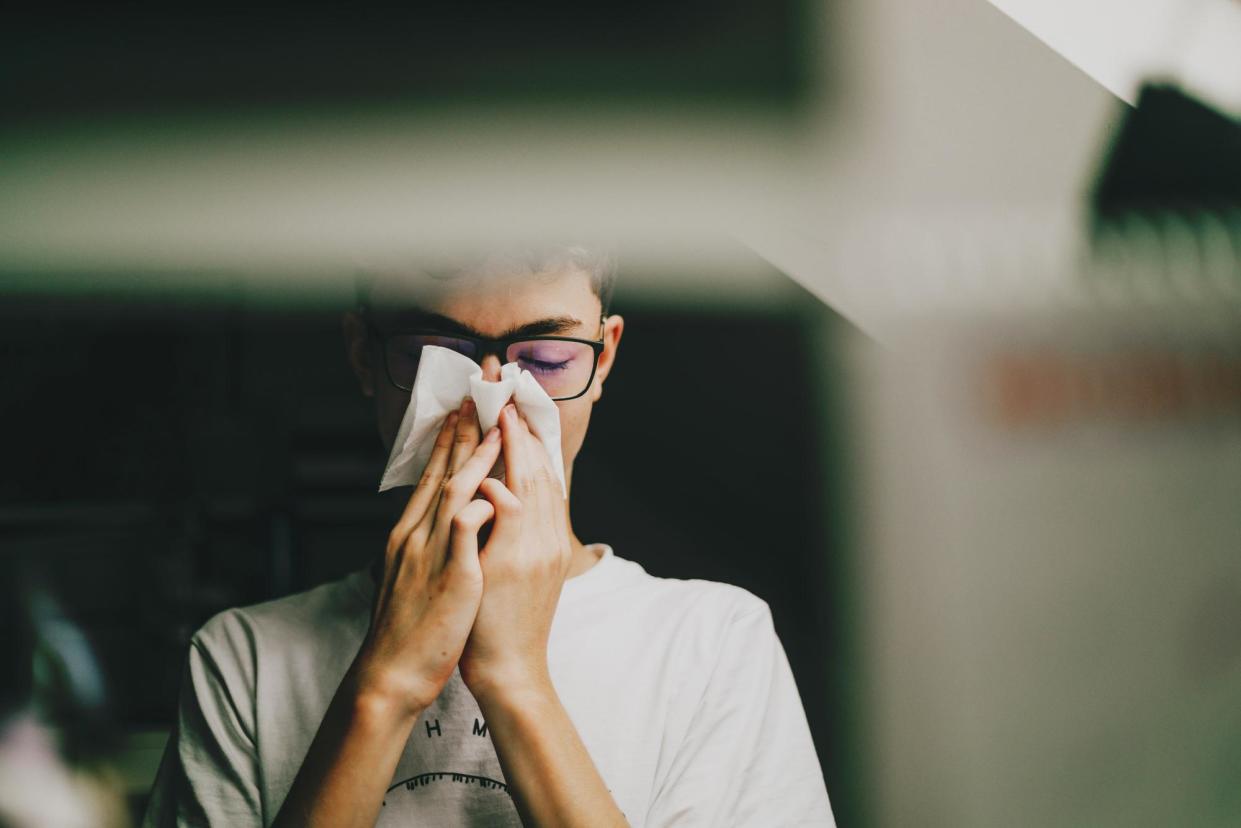Do I have seasonal allergies or is it the common cold?

Ah, spring. A time of thawing and rebirth, of blooms bursting forth from frost. Days become longer, warmer and – oh no, what’s this? A tickle in your throat. Pressure building in your sinuses. A runny nose. A sneeze. Another sneeze. Was there ever a time before sneezing?
But is it allergies or a cold? Beautiful as springtime may be, the emerging greenery can also expel waves of allergens. So how can you tell if your runny nose is the result of unruly pollen or a virus? Are you infectious or is your immune system overreacting to an outside stimulus?
People often get the two confused, says Dr Jesse Bracamonte, a family physician with Mayo Clinic Family Medicine. In both cases, he explains, there is “nasal stuffiness, a runny nose and sneezing”.
The “allergies or cold question” is now relevant for more of the year. As average global temperatures rise, allergy seasons are getting longer and more intense. According to one study, between 1990 and 2018, the US pollen season got 20 days longer and pollen concentration increased by 21%. In the UK, the Health Security Agency (UKHSA) warns that pollen allergy season, which typically started around March, could now start as early as January or February.
So how can you tell seasonal allergies from a cold? We asked experts to explain.
What are seasonal allergies?
Allergies happen when your body’s immune system overreacts to a substance that it thinks is dangerous, according to the Mayo Clinic.
Seasonal allergies, sometimes known as hay fever or seasonal allergic rhinitis, affect roughly one-quarter of adults in the US and the UK. Symptoms tend to spike as seasons change and plants release pollens that send vulnerable immune systems into overdrive.
“In the spring, tree pollen is the primary allergen,” says Dr Neeta Ogden, director of the Allergy, Asthma and Sinus Center in Edison, New Jersey, and spokesperson for the Asthma and Allergy Foundation of America. In the summer, she says, the primary allergen is grass pollen, and in the fall, it tends to be ragweed.
In the UK, according to the UKHSA, trees like hazel and birch kick off allergy season in the spring, followed by grass pollen from May until July. Weed pollen, such as dock and mugwort, usually floats around from June to late autumn.
What is a cold?
“The ‘common cold’ typically refers to a virus that affects individuals during particular times of the year,” says Bracamonte.
Most commonly, he says, the term refers to the rhinovirus, which tends to be most prominent in the spring and summer months. He adds that other types of viruses, like the flu or RSV (respiratory syncytial virus) can also result in cold-like symptoms.
How are cold and allergy symptoms different?
In the case of both colds and allergies, many symptoms require the sufferer to keep plenty of tissue paper on hand due to congestion, nasal discharge and sneezing. Experts also say that both can cause fatigue.
Still, there are differences. Bracamonte notes that allergies tend to cause itchiness around the eyes and in the throat, while a cold may cause a sore throat, but usually not itchiness.
If you feel like you’re “swallowing glass”, Bracamonte says, “it’s probably a cold”.
Cold symptoms also usually resolve themselves after several days, says Ogden, while seasonal allergies “continue throughout the season”.
A cold is also infectious, while allergies are not. A cold can be passed onto others through the air, or by droplets left behind on surfaces. “If you’re actively sneezing and having those symptoms, typically you’re contagious,” says Bracamonte.
In most cases, he says, a cold can last anywhere from three to seven days, though symptoms may last longer or be more severe for those who are older or have weakened immune systems.
Related: How much coffee is OK for me to drink in a day? I asked the experts
What are the most effective treatments for seasonal allergies?
There are a variety of ways to treat seasonal allergies, says Ogden. She explains that saline nose rinses can cut down on mucus and rinse allergens from your nose. Eye drops can help with red eyes and itchiness. And over-the-counter corticosteroid nose sprays and antihistamines can help reduce many allergy symptoms. For the latter, she recommends looking for a “long-acting, non-drowsy” variety.
Decongestants can also be helpful, she says, though you should check with your doctor before using one if you have high blood pressure, glaucoma, thyroid disease or trouble urinating.
Ogden also suggests downloading a pollen app “so you can track pollen count and stay indoors on those high days”. And if your symptoms don’t improve with over-the-counter medicines, she recommends seeing a doctor.
What are the most effective treatments for a cold?
For most healthy individuals, Bracamonte says, the answer is pretty straightforward: “Time, rest, staying hydrated and staying home.” It’s also important to keep away from others, “so you don’t get them sick”.
Did you write this article because you had a runny nose for three days and you couldn’t tell if it was allergies or a cold?
Yes, and FYI, it was a cold.

